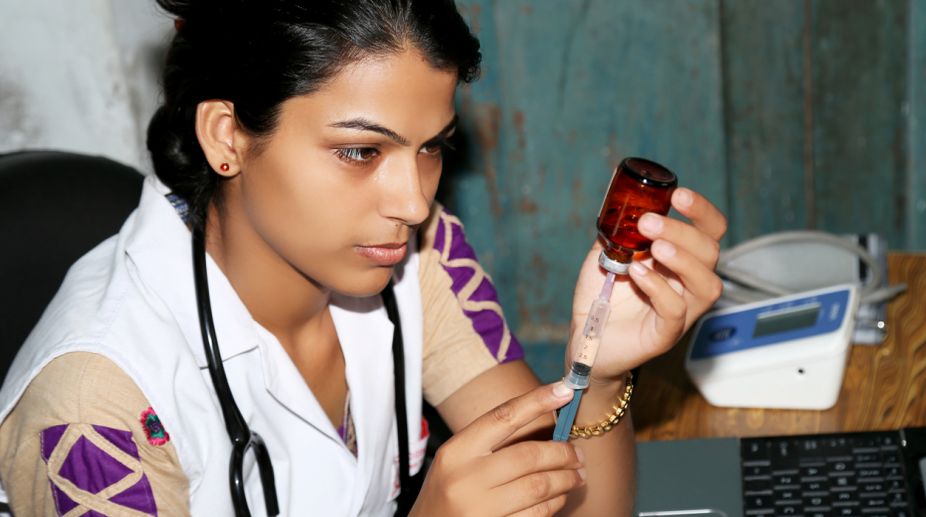UP govt to monitor vaccination through app to ensure no child is left behind
The Uttar Pradesh government is providing digital training to staff nurses, ANMs, and health visitors to ensure every child receives regular immunisation.

Representational image (Photo: Getty Images)
Kiran Behn Vasava, along with her infant, is among a host of women and children queuing up at an Anganwadi Centre at Dabuka village of Dediyapada taluk in Gujarat’s Narmada district. The occasion is Mamta Divas (Health and Nutrition Day) when pregnant, lactating women and children under five undergo health check-ups and immunisation.
Kiran frequents the Anganwadi as she wants her child to be disease free. Pregnant Ameena and Sumitra Behn Vasava say, “We have learnt that vaccines are necessary for the mother and child.
Advertisement
Besides we are given tips on how to care for ourselves during pregnancy.” The Auxiliary Nurse Midwife (ANM) shows them the wheel chart and advises them on their diet and vitamin supplements to be taken. Gujarat, one of India’s wealthiest states, has the dubious distinction of having a low immunisation rate.
Advertisement
Peeved at the dismal record of his home state, Prime Minister Narendra Modi launched the Intensified Mission Indradhanush project in Gujarat last week. The state government, with the help of UNICEF, has started the “Mamta Divas” strategy all over the state. Its main objective is to reduce infant mortality through effective delivery of health and nutrition services, says Dr Prashanth Kumar, health officer, UNICEF.
In fact, Dediyapada itself has seen a significant improvement in Infant Mortality Rate(IMR) following the drive.The IMR, which stood at 40 deaths per 1000 live births in 2013-14 had in 2016-2017 reduced to 33, said Dr N C Vekaria, Narmada district’s chief health officer. On Mamta Divas, held every Wednesday, the mother and child visit primary health centres (PHC) or anganwadis, which have toys, posters and self-monitoring wheel chart on maternal and child health. The chart informs about new-born caring practices, health and hygiene. At the centre, women and children are weighed, physically examined and then immunised.
The vaccination is recorded in e-Mamta, a mother and child tracking portal devised by Gujarat and replicated by other states. Dr Prashanth said each beneficiary is given a unique ID that not only helps maintainimmunisation record but also trace anyone who migrates from the area. The system aims at registering individual pregnant women, children in the age group 0-5 years and adolescents, along with their full details to ensure complete service delivery of ante-natal care, child birth, post-natal care, immunisation, nutrition and adolescent services and to track the left outs, he says. Immunisation helps protect pregnant mothers and children from vaccine preventable diseases. It is a cost-effective public health investment for future generations, said Dr Prashanth.
Dediyapada taluk, said Dr Vekaria, had a dismal immunisation rate of 50-55 per cent in 2013 but now it is a decent 97 per cent, while other taluks in the district ~ Nanded, Tilakwada, Garudeshvar and Sagbara ~ have crossed the 100 per cent mark. He said this was made possible due to the intervention of UNICEF, NGOs, Forest Samitis, and voluntary workers.
Being a forested area inhabited by tribals living in far-flung hillocks, spreading awareness and getting the villagers to attend health centres was no mean task. Dr V K Koushik, founder of NGO INRECA Sansthan, said, “We conduct baseline surveys and identify mothers with children below two-years-old besides pregnant women in the intervention area.
We then engage with them through Faliya workers or volunteers, ANMs, ASHA workers and forest samiti members. They raise awareness, address people’s doubts and clear their misconceptions. In this way we were able to substantially increase Mamta Day participation. But challenges remain, like inaccessible areas and stubborn tribes such as the Satpathi tribe, who refuse to be convinced.” “However,” said Dr Prashanth. “We hope to remove all bottlenecks.
Update micro plans to increase access to hardto-reach areas, urban poor and migrant population, strengthen capacity building, vaccine logistics and cold chain management.” Cold chain management involves keeping vaccines under the required temperatures and transporting them to public health centres. The number of cold chain points have been increased to 2089 in Gujarat, he added.
Narmada district is all set to achieve the target of to ensure full immunisation to more than 90 per cent of children and pregnant women by December 2018, concluded Dr Vekaria.
Advertisement
The Uttar Pradesh government is providing digital training to staff nurses, ANMs, and health visitors to ensure every child receives regular immunisation.
Zambian health authorities announced that 672,100 people in three districts battling a cholera outbreak have received oral cholera vaccines.
True burden of vaccine-preventable diseases among the adults in the country still remains unknown, claimed the infectious diseases experts here, today.
Advertisement
